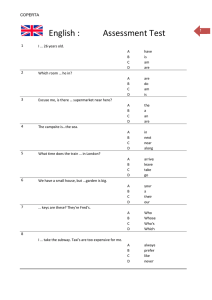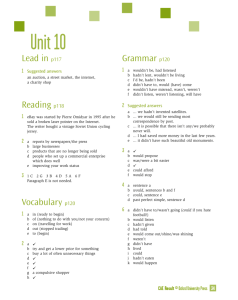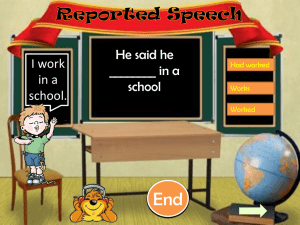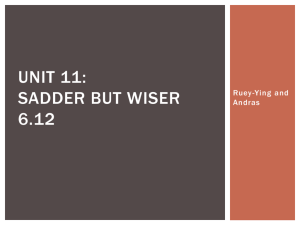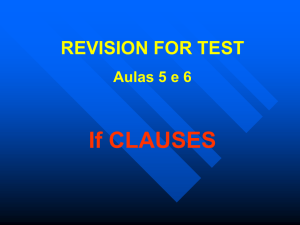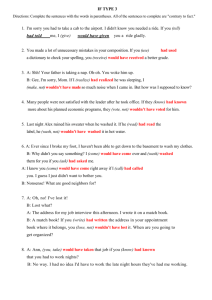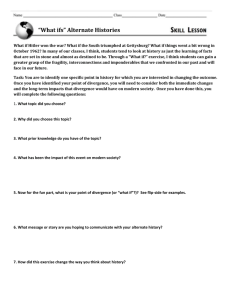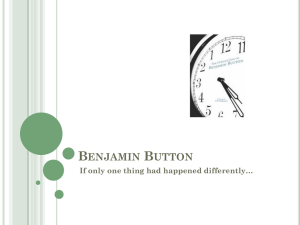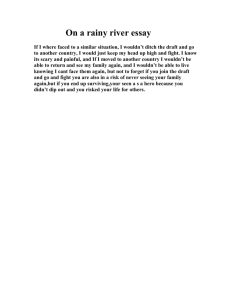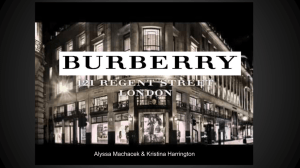Unit 8 - Newexpressupper
advertisement
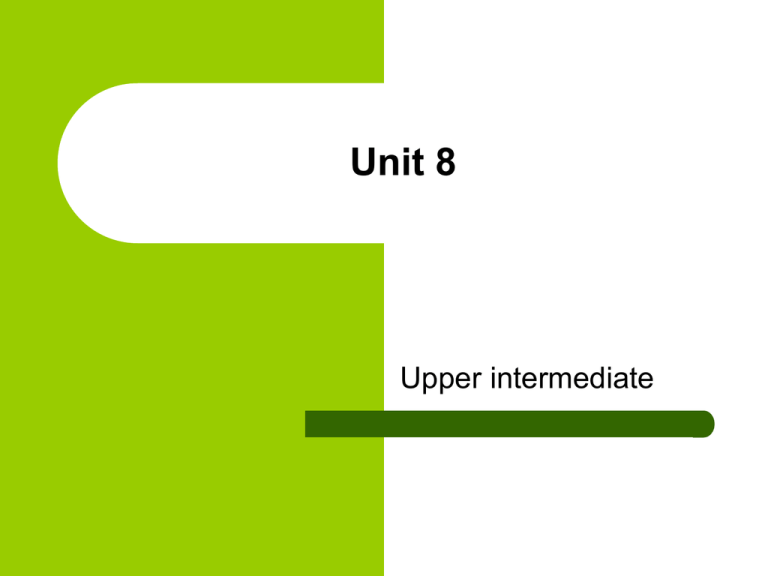
Unit 8
Upper intermediate
Unit 8
Ferrari, Rolex
What do these brands represent? What
words would you use to describe them?
Do you own any luxurious items?
Unit 8
Ferrari
Italian sports cars. Company started by Enzo Ferrari
in 1945. Since 1969 it is owned by Fiat.
Headquarters in Modena. Famous emblem is a black
horse on a yellow background. The cars are red.
Vocab.: ultimate status symbol (symbol prestiže),
unique, flashy (blýskavý), loud, sleek (elegantní)
Unit 8
Rolex
Luxury watch, company created in 1905 by a Swiss
watchmaker Hans Wilsdorf and his British brother-in
–law, Alfred Davis. They were the first to invent the
waterproof watch.
Vocab.: luxurious, expensive, excellent quality,
stylish, unaffordable
Unit 8
P. 82-1
Look at the photos and match the words.
82-2
Burberry
What do you know about it?
Read the statements and decide whether they are
true or false.
Unit 8
1F
Thomas Burberry can´t have know…..
Do you know anything about the Italian company
DeCoro?
83-3
Discuss in pairs, then listen and check.
2F
3T
4T
5F
6T
Unit 8
DeCoro was founded in 1977 by Luca Ricci, an
Italian businessman. The company has become the
first producer of quality Italian leather upholstored
furniture in China. DeCoro imported traditional Italian
craftsmanship and combined this with skilled
workforce in China to deliver exceptional products
around the world. Its state-of-the-art factory was
opened in 2003 and is the largest sofa factory in the
world. Its biggest market is the USA followed by the
UK, then the rest of Europe.
Unit 8
1. Why do DeCoro describe their sofas as „Made in Italy“?
Because the leather and the techniques used to make the sofas are
Italian.
2. Why did DeCoro set up production in China?
To keep production costs, particularly labour costs, down.
3. What other advantages are there to manufacturing in China?
They can preserve traditional Italian production methods.
Unit 8
83-4 discuss
You came to class at 8,30 o´clock. Ypu are
here now.
If I not come / class / not / be / here.
Unit 8
If I had not come to class, I would not be here.
Did you come to class at 8,30? (in the past)
Are you here now?
Mixed conditional
If + had + past participle + would + infinitive
83-5 listen and complete the sentences.
Unit 8
1.
had set up
5.
had happened
2.
would now be
6.
wouldn´t now be sitting
3.
hadn´t gone
7.
should they have described
4.
would have been lost for ever
Unit 8
Picture on the board
If car A hadn´t overtaken car B, it wouldn´t have hit the man.
If it hadn´t run over the man he wouldn´t have a broken arm now.
The man shouldn´t have crossed the road between two parked cars.
Car A shouldn´t have overtaken car B.
Did the man see car A?
No, he can´t (couldn´t) have seen it. He might not have seen the car.
Criticizing about the past
He shouldn´t have crossed between two parked cars.
Speculating about the past.
I´m sure he didn´see the car. = He can`t have seen the car.
Perhaps he didn`t see the car. = He might not have seen the car.
Unit 8
P.84 Past modals
1c
2a,b,d
Rule:
Past model sentences are formed by taking the
modal verb {must, could, should, can`t, may ..} and
adding have and the past participle.
Unit 8
P. 84/ 3rd conditional and mixed conditionals
Read the sentences.
1. They refer to the past. They refer to an unreal situation.
2. 3rd conditional
If + had + past participle, would {n`t} + have + past participle. [definite
consequence]
If + had + past participle, might / could {not} + have + past participle. [ possible
consequence]
Mixed conditional
If + had + past participle, would {n`t} + infinitive.
[present consequence]
Unit 8
Practise 1/ 84
1. If Thomas Burberry hadn`t invented gabardine, he wouldn`t have been able
to open a shop in London.
2. If the Burberry coat hadn`t been worn by several famous Hollywood stars, it
wouldn`t have / might not have increased in popularity.
3. If Burberry had not had a British image, it might not have been a success in
Asia.
4. If Rose Marie Bravo hadn`t been brought in as CEO, the company might not
have been turned around.
5. If Rose Marie Bravo hadn`t introduced new products and an advertising
campaign, the company wouldn`t now be worth over 2 billion pounds.
Unit 8
2/84
1. You must have left them at home.
2. You can`t have / should have locked your office.
3. You must have sent it to the wrong address.
4. He can`t have / should have read the memo.
5. You shouldn`t have told anyone your password.
6. You should have made back-up files.
Unit 8
3/85
1. He can`t attend this meeting – he`s on business in
Birmingham.
2. If we had had more time, we could have done a better job.
3. Sorry, I should have told you – we finish at 4,30 on Fridays.
4. If he had asked me, I could have told him what to do.
5. If I hadn`t worked so hard, I wouldn`t be where I am now.
Unit 8
4/85 Homework
Rose Marie Bravo´s
work for Burberry
1. Can´t / couldn´t have
been
6. Might have worried
2. hadn`t renegotiated
7. Should have done
3. could/ might/ would
have lost
8. hadn`t been
4. Had gone / went
9. might/ would not
have become
5. might/ would not
have been admitted
10. May have sold
Unit 8
5/85
Read the newspaper headline and decide
what the company might have done wrong,
what they should have or shouldn`t have
done and what would or wouldn`t have
happened if they had done things differently.
Unit 8
How important is the personal image in the
Czech Republic? What are the main status
symbols? {luxury cars, designer clothes,
private education…}
Unit 8
In Unit 7 there was a problem on the tour Latin goes
East. Aleks` arrival had been delayed.
Have you had any problems at work this week?
Pei Lin had got another problem. P. 90, read the
email, 20 s, read through the email just to find out
the answers to questions 1 and 2.
Read the email again and try to answer the other two
questions.
Unit 8
Key to 1/90
1. Fritz has to return home.
2. Seeing if the other applicant on the short list is
available to come out.
3. I`m sorry to have to tell you this.
I`m afraid we`ve got a problem.
4. She`s not confident because she says: ‘at the
moment the only solution I can think of is …’
Unit 8
Breaking
bad news
Reacting
to bad
news
Giving
good
news
Reacting
to good
news
Proposing
a solution
Unit 8
1 minute / try to note down as many phrases
as possible for the previous topics.
Then p. 90 match the phrases with the
situation.
Unit 8
Breaking bad
news
Reacting to
the bad news
Giving good
news
Reacting to
the good
news
Proposing a
solution
I`m sorry to have to
tell you this …
Oh no, what now?
Here`s something I
think you might like.
That` s a terrific
idea.
I`ve thought of
another solution.
That`s great.
The only solution I
can think of is to …
I`m afraid we`ve got
a problem.
I`ve got to tell you
there`s been some
more bad news …
It sounds like we`ve
got some real
problems.
Wow, that is bad
news.
It`s terrible news
about …
I don`t know about
how you`ll feel about
it, but how about if
…
Unit 8
P. 91/3
Look at the questions, can you think of the answers?
Listen and check.
Listen again, which of the phrases from the box did
you hear?
Split up = break up, break a contract
Par for the course = usual, typical
Unit 8
3/91
1. He comes out and takes over.
2. They`ve had an argument and split up.
3. He1ll talk to them and try to get them to
stay until he gets there on Monday.
Unit 8
5/91
Write the dialogue.
6
In threes, discuss the situation.
Files p. 119
Review units 7, 8
1/92
1. would just like
2. would be really grateful
3. would be
4. use
5. would get
6. had thought
7. would have done
8. goes
9. will have
Review units 7, 8
2/92
a/ can`t = impossibility
b/ might not = there is a possibility that he didn`t read
my email
c/ should have= it would have been a good idea
must have = it is certain that she warned him
d/ should have= it would have been a good idea
would have = but we didn`t for some reason
e/ not possible
f/ not possible
Review units 7, 8
3/92
a/ Welcome back! Did you have a good time?
b/ I hear you got the manager` s job.
Excellent news!
c/ Do you like your new place? Have you
settled in yet?
d/ Too bad about United losing. You must be
really upset.
Review units 7, 8
4/92
1. mean by
2. saying
3. exactly
4. did, say
5. see
6. correct me
7. just
